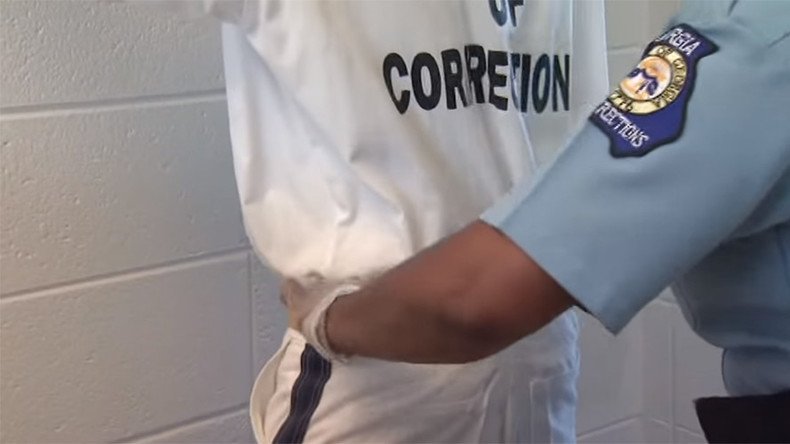‘Staggering corruption’: Feds accuse 49 Georgia prison guards of taking bribes, drug trafficking

Federal agents have indicted 49 Georgia prison guards and officers on charges of drug trafficking and accepting bribes. The arrests were part of a two-year undercover operation to crack down on contraband and criminal activity in the state’s prisons.
“[These] indictments against 49 individuals revealing staggering corruption within the Georgia Department of Corrections,” said John Horn, the United States Attorney for the Northern District of Georgia.
The allegations led to arrests across the state on Thursday after raids at nine prison facilities, CNN reported. The operation found criminal and corrupt activities in just under a third of the state’s prisons.
#FBI announced Operation Ghost Guard, widespread public corruption in the GA prison system https://t.co/rqYjjNCwTZpic.twitter.com/zeNPStAhiM
— FBI (@FBI) February 11, 2016
As a result of its probe, the FBI accused 45 former and current prison guards and staff of allegedly smuggling contraband such as liquor, tobacco, and cell phones into cell blocks for money. Inmates used the illegal cell phones to commit wire fraud, money laundering, and identity theft. Guards also allegedly wore their official uniforms or displayed their badges to help traffic multiple kilograms of cocaine and meth in exchange for thousands of dollars in bribe money.
The FBI said the corrupt guards typically earned $500 to $1,000 for smuggling a single cell phone to a prisoner.
“Between 2014 and 2015, more than 23,500 contraband phones were seized throughout Georgia prisons – which house 50,000 inmates – and those phones were used for a variety of crimes that put prison security and public safety at risk,” the FBI said in a statement.
The average salary of a Georgia correctional officer is between $37,000 and $46,000, below the national average, according to Salary.com.
The FBI arrested 46 current and former correction officers in a sting at nine facilities around Georgia. SE-011TH & SE-010TH on Bit.
— CNN Newsource (@CNNNewsource) February 11, 2016
The FBI said prison inmates in Georgia were able to raise money through so-called “jury scams” and then bribe prison guards. The scams involved an inmate calling a potential victim and impersonating a law enforcement officer, claiming the victim had failed to appear for jury duty. They were then told they had the choice of being arrested on warrants or paying fines to have the warrants dismissed.
Many victims agreed to pay the fines. In order to do this, they were instructed to purchase pre-paid cash cards and provide the account number to the inmate or wire money directly into a pre-paid debit card account held by the inmate, the FBI said. The inmate used an outside accomplice to transfer the money to a different pre-paid card, which could then be turned into cash. “That effectively laundered the money,” the FBI stated. The cash was then transferred back to the inmate.
Among those arrested were five members of an elite squad aimed at busting up drug dealing in prison, called the Cobra unit. Two civilians and one inmate were also included in the indictments.
.@LindsayFrance of @RT_America takes on #prison phone industry, interviews our Aleks Kajstura. Excellent piece! http://t.co/hUA3a6JDIj
— Prison Policy Init. (@PrisonPolicy) August 14, 2015
The FBI’s crackdown – called Operation Ghost Guard – was launched in May of 2014 after a North Carolina prisoner was able to organize a kidnapping using a contraband cell phone. The prisoner, who was serving a life sentence in North Carolina, wanted revenge on the prosecutor who had helped convict him. Using the phone, the prisoner enlisted the help of fellow gang members to kidnap the prosecutor’s father and drive him to Atlanta, where he was to be tortured and killed. The FBI’s Hostage Rescue Team was able to reach him before he was murdered. The incident prompted the FBI Public Corruption Unit in Washington, DC to launch the nationwide Prison Corruption Initiative.
“When an inmate can reach beyond prison walls and threaten and intimidate witnesses and prosecutors, it’s a breakdown of the judicial system,” said FBI Atlanta Special Agent in Charge Britt Johnson to CNN.
The number of public corruption cases in prisons nationwide has tripled since the initiative was launched.
“Corrections officers might not be elected officials,” said Special Agent Joe Gonzalez, who heads the FBI’s Public Corruption Unit in Washington, DC, “but they are public officials sworn to protect the community, and we are going to hold them to that standard.”












